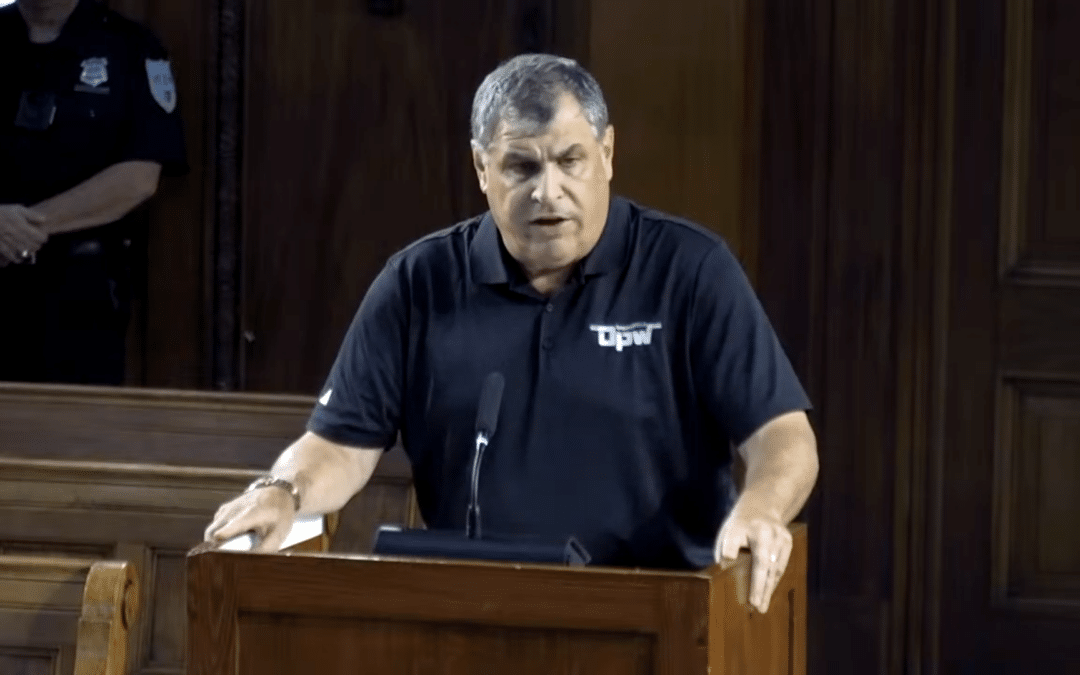Springfield DPW Director Chris Cignoli reconmends changes to the trash fees and regulations ordinance.
Photo credit: City of Springfield
SPRINGFIELD — The Springfield City Council received good news on Sept. 16 in the form of a $6 million grant from the federal Forest Service. The Speak for the Trees Grant program will help pay for the safety, maintenance and management of the urban forest, and the planting of over 6,000 trees.
Parks, Buildings and Recreational Management Executive Director Thomas Ashe said the grant was “significant” and added, “I think it will do great things in the city.” City Forester Alex Sherman said Springfield’s grant was among the largest received directly by a city.
The details of the funding were laid out by Sherman. He said $1 million of the funding would be devoted to planting 1,500 trees on public and private land to expand the city’s canopy. The trees will be planted over five years, mainly in areas of the city that lack tree cover.
Councilor Brian Santaniello asked about the process for planting trees on private property. Sherman said residents can call 311 and an arborist will visit the property and discuss the treescape with the owner to determine their needs and preferences. While the focus will be on shade trees to help increase the canopy, Sherman said ornamental or evergreen trees are also possibilities. The city will work with the residents to “find the right tree for the right place,” he assured.
Councilor Malo Brown asked if fruit trees could be planted with the funding, citing food deserts in parts of the city. Sherman said he would seek clarification on whether fruit trees were eligible. He noted there are three urban orchards in the city — at Kennedy Middle School, in Marshall Roy Park and in Johnny Appleseed Park. The latter two are open to the public and picking ripe fruit is encouraged.
The city also received $1.8 million from the state’s Greening the Gateway Cities program, which similarly focuses on private properties. “There’s plenty of trees to go around,” Sherman said.
Another project the grants will cover is turning vacant city lots into what Sherman called, “neighborhood nurseries,” where saplings will be grown until they are large enough to be planted elsewhere.
“The U.S. Forest Service suggests 40% canopy cover in urban areas,” Sherman said. Citywide, Springfield’s canopy covers 36%, but not all neighborhoods have the same level of canopy coverage, he said. Councilor Victor Davila expressed appreciation that the trees would make the city cooler and more attractive. He asked if the new trees would move the needle toward the suggested canopy density.
“It may be after my time,” Sherman said, adding that the newly planted trees will take time to become established and reach their full potential. As young trees, he said they may add 1% to the city’s total coverage.
Sherman said the grant will also pay for an urban forest management plan, beginning with an inventory of the trees in Blunt, Van Horn and Forest parks. Based on that information, the city will work to improve safety and the trails in those parks, as well as address wildfire dangers, which have been of particular concern in Blunt Park.
More than $3 million will be devoted to removing and trimming hazardous trees, including a program to cycle through neighborhoods, pruning trees before they become a problem.
Councilor Lavar Click-Bruce said he appreciated the focus of safety. He noted that he has been contacted by constituents whose children cannot utilize the sidewalk on their walk to school due to overgrown trees. Ashe said his department receives calls “almost daily” to trim trees at intersections, adding that his team works to keep trees from impacting safety.
Trash ordinance update
DPW Director Chris Cignoli addressed the council with proposed updates to the city’s trash fees and regulations ordinance. He explained that the Massachusetts Department of Environmental Protection has made changes to its requirements for municipal waste collection in recent years. One such change that took effect in November 2022 was to require the city accept mattresses for recycling.
Cignoli said that in the past, the city collected about 2,500 mattresses per year, along with other bulk items. Since the change in the law, he said they have seen the number of mattresses triple.
“It is my opinion that the majority of those are coming from outside the city,” Cignoli said, citing Springfield’s $8 bulk item fee, as opposed to surrounding communities with mattress recycling fees as high as $65. To address this, he said he would like to require two bulk item stickers for mattress pickup, at a cost of $16.
He also wanted to limit the number of mattresses that could be picked up from an address to 15 per year. He said the DPW has collected more than 35 from a single address, which he said is the result of landlords cleaning out one or more apartment buildings. “They’ll just leave 20 of them on the tree belt,” Cignoli said.
“We’re trying to figure out a way to stem the illegal import of materials from other places,” he said of the mattress issue.
Mattresses are not the only items left on the tree belt that Cignoli would like to discourage. He said people often leave couches and other furniture out for free. Councilor Kateri Walsh said many people like free “treasures” on the curb, but Cignoli said it sits “for weeks,” until becoming water-logged and moldy. To help avoid this, he said he would like to include in the ordinance the requirement that mattresses and boxsprings be wrapped for pickup.
Cignoli said he expects the DPW to spend $220,000 on mattress disposal this year. While the department used to pay for bulk item disposal by the pound, he said it is now about $28 per mattress.
Another problem Cignoli was seeking to tackle with the recommendations was radioactive waste. “This has been a huge issue lately in the city,” he said, explaining that people, or their pets, who are undergoing radiation treatment cannot dispose of medical waste in the trash.
Several of the councilors were taken aback by this issue, which Cignoli said occurs about six times per year. When Santaniello asked how they know the trash is radioactive, Cignoli explained that trash is scanned for radioactivity at the transfer station. When it is found, it must be handled differently and shipped to a safe location by a third party.
The truck the waste was transported in must be taken out of service until the vehicle’s radiation levels are safe. This can take up to six days, he said. Trash barrels along the route the truck followed are scanned with Gieger counters until the source is found. Cignoli said the resident is given information of proper disposal and noted hospitals will sometimes accept radioactive medical waste. He said he would not fine the person unless they were a repeat offender.
There is a schedule of fines in the existing ordinance, but they are set at $0. Cignoli recommended the fines each be raised to $250.
Cignoli recommended clearer language in the ordinance pertaining to when to use extra bag stickers, yard waste drop-off at Bond’s Island, revocation of trash service and the appeal process for trash service revocation. Other recommended updates to the ordinance include pickups beginning at 6 a.m., rather than 6:30 a.m.
Davila asked if the proposal would allow for revocation of trash service for nonpayment of any city fee, but Cignoli clarified that it only pertained to trash service fees.
Councilor Zaida Govan said she repeatedly receives questions about the trash fee from residents who feel their property taxes should cover trash pickup. “It doesn’t look like we’re getting rid of it today,” she said but urged the council to consider it in the future.
Councilor Jose Delgado asked if the city has a composting program or other method to dispose of yard waste. Cignoli said most yard waste that arrives at Bondi’s Island is used as cover for the landfill. However, the city uses 600 tons of compost per year and provides about 1,000 tons to residents free of charge. He said the latter was a popular program.
The recommendations were referred to the Maintenance and Development Subcommittee for review.


